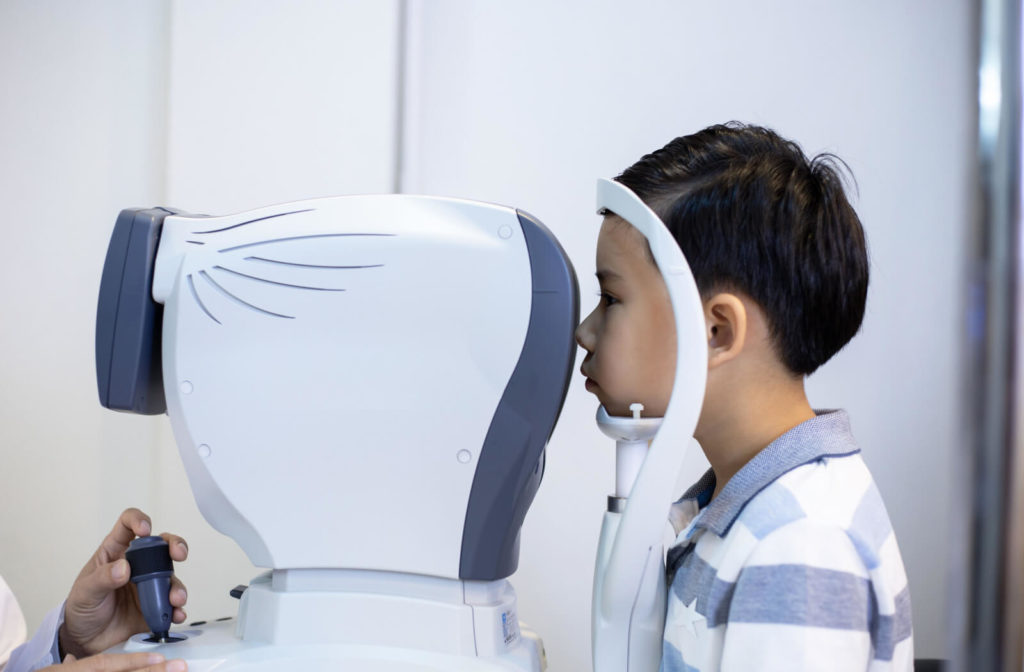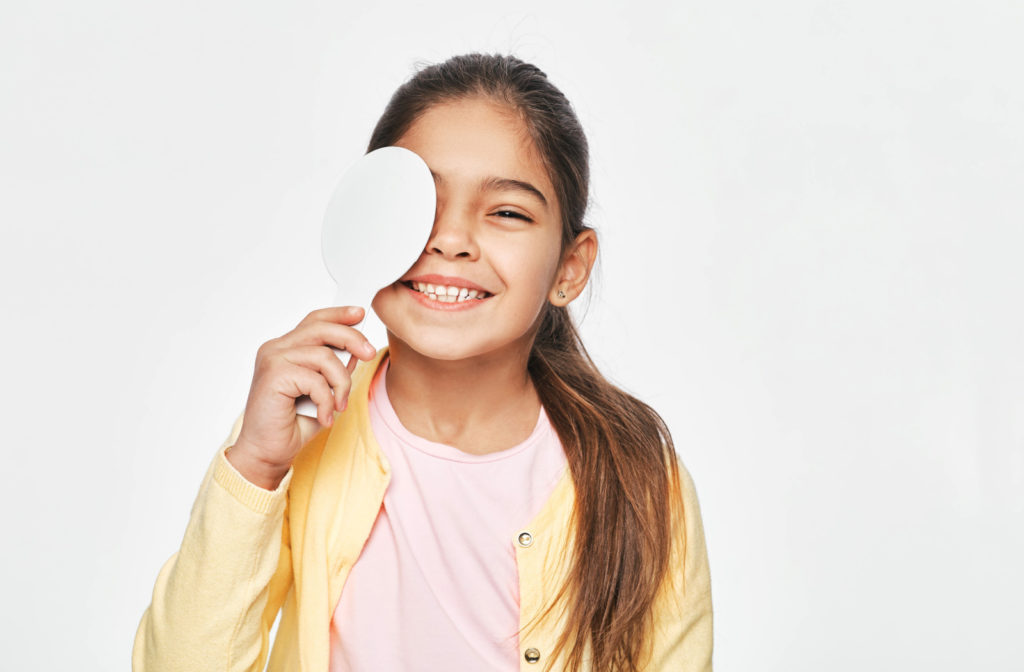Kid’s eye exams are an important part of your child’s eye development. They help with the early detection of potential eye health or vision problems.
We’re often asked questions about children’s eye exams, so we’re going to address some frequently asked questions in this blog, including:
- A child’s first exam and frequency after that
- Signs your child needs an exam
- Cost of a child’s eye exam in BC
- What to expect during and how to prepare for your child’s eye exam
Although we’re trying to cover the common questions, you may still have questions. Don’t hesitate to give our team at Discover Eyecare a shout with any questions.
What Is a Children’s Eye Exam?
A children’s eye exam is an examination of a child’s vision and eye health conducted by an eye doctor. The exam typically entails various tests and procedures to evaluate your child’s visual acuity, eye alignment, eye movements, colour vision, and overall eye health.
Children’s eye exams are similar to adult eye exams, however, the child’s subjective cooperation is not necessary. Your eye doctor will be able to test for eye health, muscle and vision concerns without requiring the child to answer questions. Although dilating pupils in children is common during their eye exam, it is not automatically part of their exam.
Importance of a Children’s Eye Exam
Regular eye exams are vital because vision problems can develop at any age, and early detection is often the key to preventing long-term complications. Vision problems can affect how a child learns, interacts with their environment, and sees the world around them. If a child has an undetected vision problem, it can result in poor academic performance, behavioural issues, and sometimes developmental delays.
Many children aren’t aware their vision is impaired, so they may not complain or express concerns. A comprehensive eye examination is the only way to detect visual deficits early enough for treatment to be successful.

Frequently Asked Questions about Kid’s Eye Exams
How Often Do Kids Need Eye Exams?
A child should see their eye doctor several times after their initial eye exam as an infant. The Canadian Association of Optometrists (CAO) lays out age-based guidelines as follows:
- Between the ages of 2 and 5, your child should get at least one eye exam.
- From the ages of 6 to 19, your child should receive annual eye exams.
Keep in mind these are general guidelines. Your child’s optometrist may recommend a different schedule if there are any issues or your child has certain vision risk factors.
When Should My Child Have Their First Eye Exam?
Infants should have their first eye exam between 6 and 9 months, according to the CAO. This visit is crucial for detecting any eye problems that may hinder their visual development. Their optometrist will perform an eye exam to ensure that the child’s eyes are working correctly and detect early signs of eye conditions or diseases. If the optometrist sees any issues, they may recommend more frequent check-ups than the general age-based guidelines.
What Are the Signs My Child Needs an Eye Exam?
When it comes to your child’s eyes, you can look for some signs they may have a vision problem, such as:
- Squinting
- Rubbing their eyes a lot
- Complaining of blurry vision
- Frequent headaches
- Short attention span
- Behavioural problems
- Poor hand-eye coordination
Do Kids Get Free Eye Exams in BC?
The Medical services Plan (MSP) of British Columbia covers children for 1 comprehensive eye examination annually. MSP also covers medically required services, such as exams and treatments for eye diseases, injuries, trauma, or systemic conditions that affect eye health, like diabetes.
However, a minimal fee may be charged for testing with new technology equipment not covered by MSP, which adds to the thoroughness of the exam.
What Happens During a Kid’s Eye Exam?
The optometrist will use various tools and instruments to examine your child’s eyes. Most of these procedures are non-invasive and comfortable for children.
The eye doctor may ask questions about your child’s medical history and vision to have a better understanding of their visual health. A dilated pupil assessment is not necessarily required at this stage unless your child has associated risk factors of eye conditions.
Is Vision Screening Sufficient for My Child?
Vision screenings are a good thing as part of a child’s eye care, but it’s a general assessment of vision health and isn’t designed to detect specific eye problems or diseases. Vision screenings aren’t always performed by an eye care professional, so your child will still need a comprehensive eye exam to help protect their vision health.
Preparing Your Child for an Eye Exam
An eye exam can be a daunting experience for children, particularly if it’s their first time. Parents can help prepare their children for the exam by reassuring them it won’t hurt and explaining what will happen during the test. You can tell them they may be asked to read letters or look at pictures on a chart with one eye open at a time.
Encourage them to ask questions, and let them know that we do our best to help them feel comfortable throughout the process. Of course, you can always make it a fun outing by taking them out for ice cream or to a park afterward.
Book Your Child’s Next Eye Exam
Children’s eye exams are critical in early detection and treatment of potential vision problems. Regular check-ups support your child’s eye development. They can help avoid long-term issues that can impact their academic performance and quality of life. Whether it’s their first exam or a routine check-up, our team at Discover Eyecare is committed to providing a comfortable and informative experience for you and your child.
Remember, if you have any questions or concerns after reading this blog, don’t hesitate to reach out. Our team is available to answer your questions and book an appointment for your child’s next eye exam.



